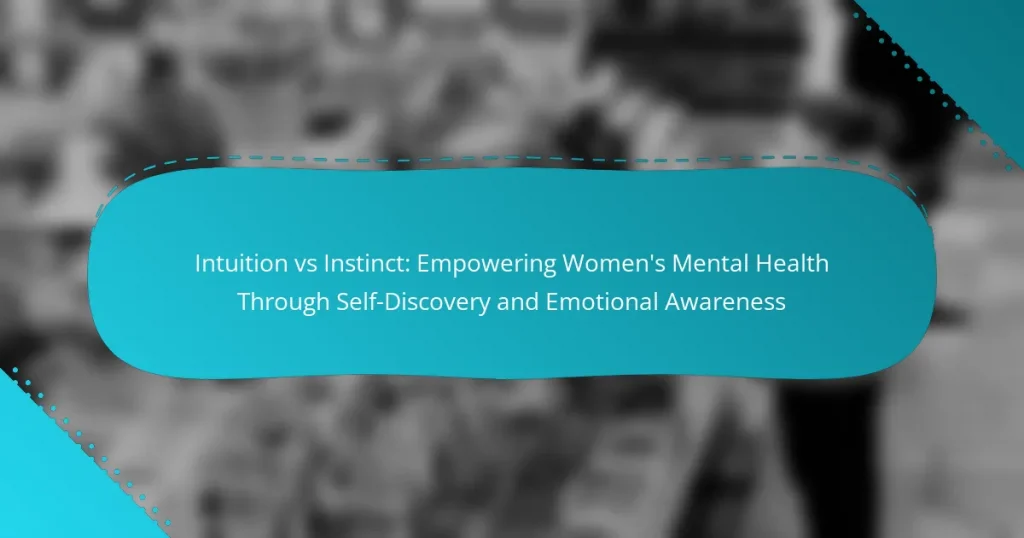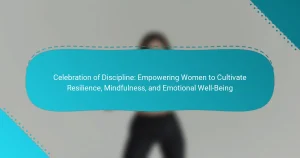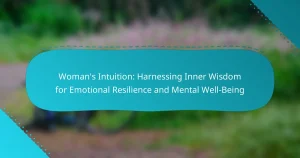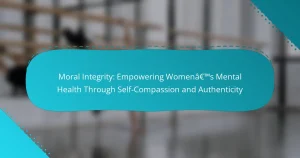Empowering women’s mental health involves understanding the differences between intuition and instinct. This article explores how trusting intuition fosters self-discovery and emotional awareness, while instinct aids in immediate responses. It addresses societal challenges that hinder women’s recognition of their intuitive abilities. Lastly, it highlights practices like mindfulness and self-reflection that promote a balance between intuition and instinct, enhancing overall well-being.
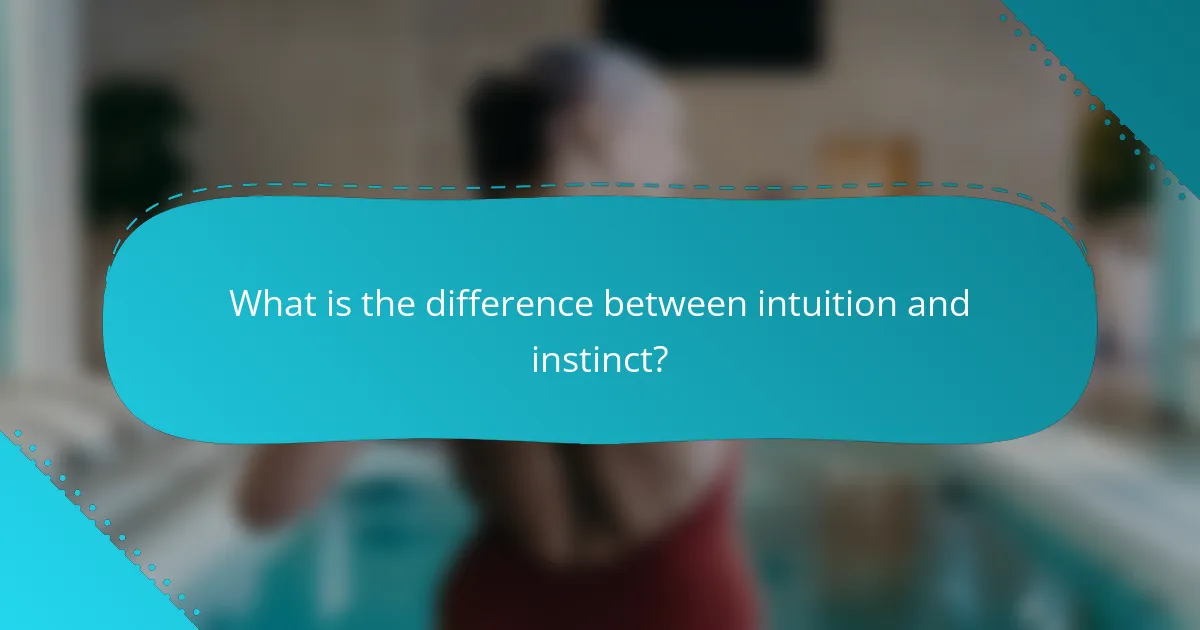
What is the difference between intuition and instinct?
Intuition and instinct both guide decision-making but differ fundamentally. Intuition arises from subconscious processing of experiences, while instinct is an innate response to stimuli. Understanding these differences enhances emotional awareness and self-discovery, empowering women’s mental health. Intuition often includes reasoning based on past experiences, while instinct is a biological reaction to immediate threats or needs. Recognizing this distinction can help women make informed choices that align with their emotional well-being.
How do intuition and instinct influence women’s decision-making?
Intuition and instinct significantly shape women’s decision-making by fostering emotional awareness and self-discovery. Intuition often guides choices based on subconscious insights, while instinct provides immediate responses to situations. Research indicates that women frequently rely on these internal cues, resulting in more holistic decision-making. This dual influence enhances mental health by promoting confidence and self-acceptance, allowing women to navigate challenges effectively. Understanding these dynamics empowers women to trust their instincts and develop their intuitive abilities.
What role does emotional awareness play in distinguishing between intuition and instinct?
Emotional awareness is crucial in differentiating intuition from instinct. Intuition arises from emotional insights and past experiences, guiding decisions based on feelings. In contrast, instinct is an automatic response to immediate situations, often driven by survival instincts. Understanding emotions enhances self-discovery, empowering women to trust their intuitive insights while recognizing instinctual reactions. This distinction fosters better mental health and informed decision-making.
How can women develop emotional awareness?
Women can develop emotional awareness by practicing mindfulness and self-reflection. Engaging in journaling enhances understanding of emotions and triggers. Establishing a support network fosters open communication about feelings. Additionally, participating in workshops focused on emotional intelligence can provide valuable tools and techniques. These practices empower women to navigate their emotional landscapes effectively, leading to improved mental health and self-discovery.
What are the signs of relying on intuition versus instinct?
Relying on intuition often manifests as a deep, instinctive understanding, while instinct typically involves immediate, reflexive reactions. Key signs of intuition include thoughtful consideration, emotional resonance, and a sense of clarity over time. In contrast, instinct may present as quick, automatic responses driven by survival or learned behavior. Recognizing these signs enhances emotional awareness and supports women’s mental health through self-discovery.
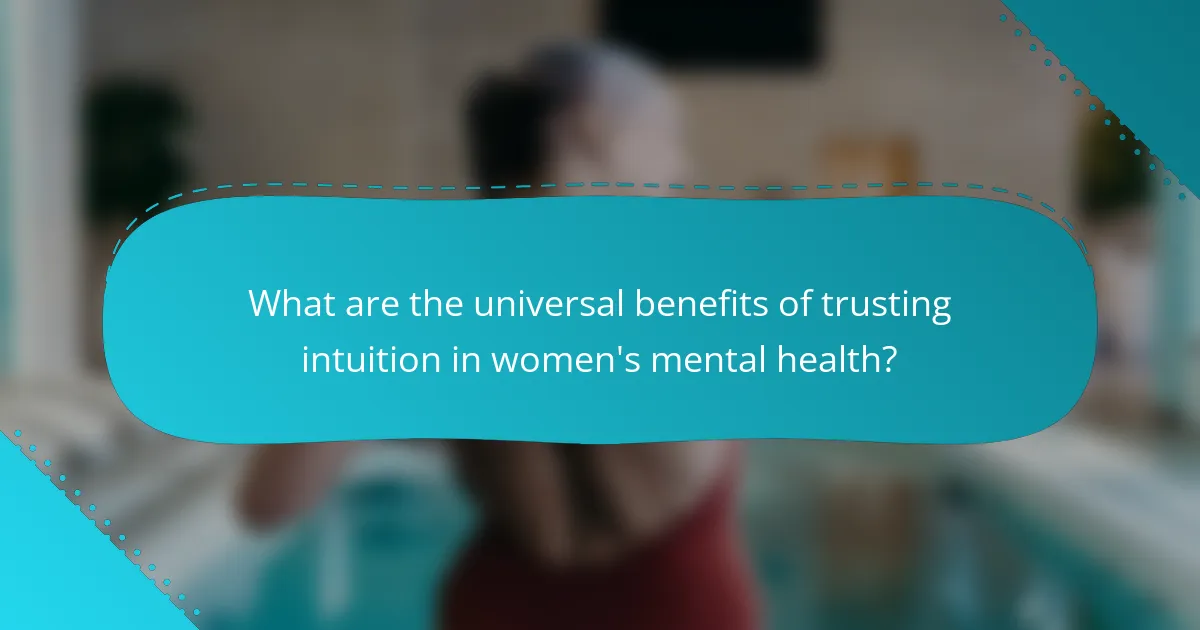
What are the universal benefits of trusting intuition in women’s mental health?
Trusting intuition significantly enhances women’s mental health by fostering self-discovery and emotional awareness. It promotes confidence in decision-making and encourages authentic self-expression. Women who embrace their intuition often report reduced anxiety and improved emotional resilience. Additionally, intuitive insights can guide personal growth and strengthen relationships, contributing to overall well-being. By prioritizing intuitive practices, women can cultivate a deeper connection with themselves and their mental health journey.
How does intuition contribute to personal empowerment?
Intuition enhances personal empowerment by fostering self-awareness and decision-making. It allows individuals to trust their inner voice, leading to more authentic choices. This self-discovery is crucial for women’s mental health, as it builds confidence and emotional resilience. Engaging with intuition can reveal unique insights, helping women navigate challenges and affirm their identities.
What psychological benefits can arise from trusting one’s intuition?
Trusting one’s intuition can enhance mental health by fostering self-awareness, boosting confidence, and improving decision-making. This psychological empowerment enables women to navigate challenges effectively. Research indicates that intuitive decision-making often leads to greater satisfaction and emotional resilience. Embracing intuition allows for deeper emotional connections and personal growth, reinforcing the importance of self-discovery in mental well-being.
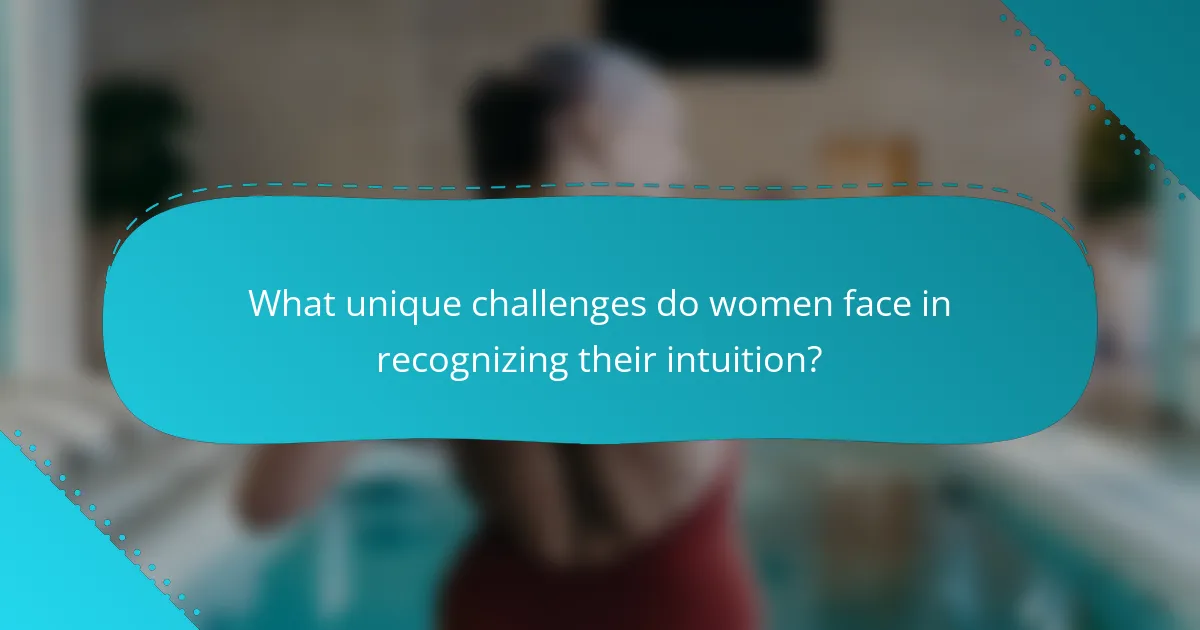
What unique challenges do women face in recognizing their intuition?
Women face unique challenges in recognizing their intuition due to societal conditioning and self-doubt. Cultural expectations often prioritize rationality over emotional insight, leading to internal conflict. Many women experience pressure to conform to external validation, diminishing their trust in personal instincts. Additionally, the fear of judgment can suppress intuitive responses, making self-discovery and emotional awareness difficult. Empowering women to embrace their intuition requires fostering environments that encourage self-reflection and validation of their feelings.
How do societal expectations impact women’s intuition?
Societal expectations can undermine women’s intuition by promoting self-doubt and limiting emotional awareness. These pressures often prioritize conformity over self-discovery, leading to diminished confidence in personal insights. As women navigate these expectations, fostering emotional awareness becomes crucial for reclaiming their intuitive abilities. Research indicates that enhancing emotional intelligence can empower women to trust their instincts more effectively, thus improving mental health outcomes.
What are the barriers to trusting intuition among women?
Women often face societal and internal barriers that hinder their trust in intuition. These barriers include cultural conditioning, fear of judgment, and lack of validation. Cultural norms often prioritize logic over intuition, leading women to doubt their instincts. Fear of judgment can prevent them from expressing intuitive insights, while lack of validation from peers or authority figures diminishes confidence in their feelings. As a result, these factors create a cycle that discourages women from embracing their intuitive abilities, impacting their mental health and self-discovery journey.
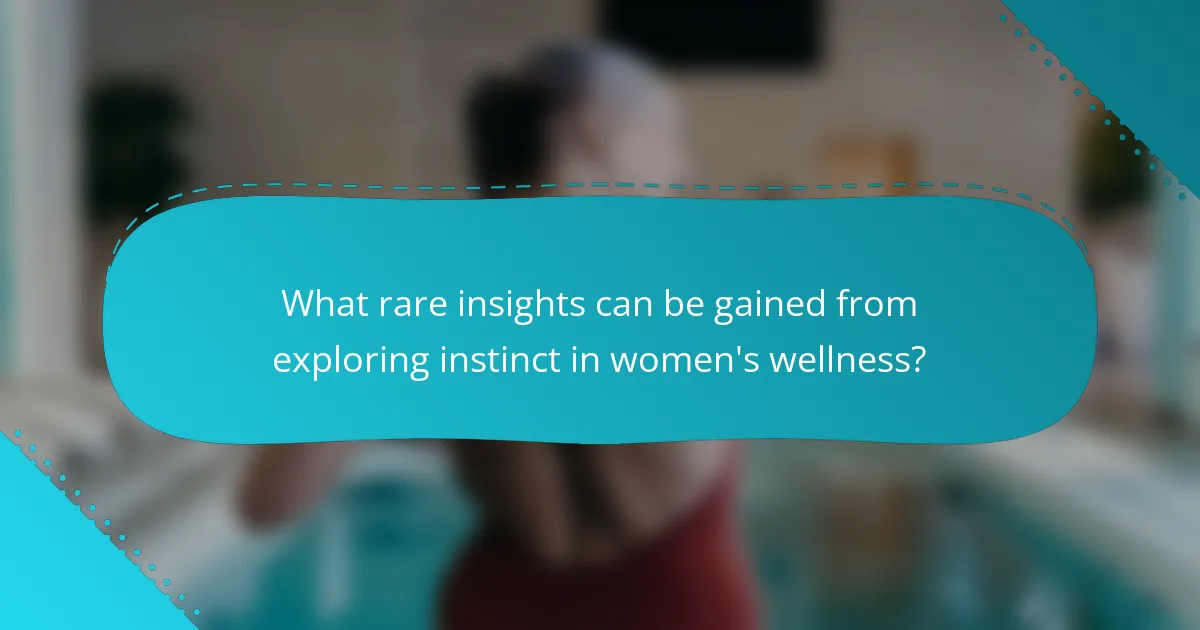
What rare insights can be gained from exploring instinct in women’s wellness?
Exploring instinct in women’s wellness reveals rare insights into self-awareness and emotional regulation. These insights empower women to trust their intuition, enhancing mental health and resilience. Research shows that women who engage in self-discovery often report improved emotional well-being and decision-making capabilities. By understanding instinct, women can navigate challenges more effectively, fostering a deeper connection with themselves and their experiences.
How can understanding instinct enhance self-care practices?
Understanding instinct enhances self-care practices by fostering self-awareness and emotional regulation. By recognizing instinctual responses, women can make informed decisions that align with their mental health needs. This awareness reduces stress and improves overall well-being. Engaging with instinct allows for deeper self-discovery, empowering women to trust their feelings and instincts, leading to healthier coping mechanisms. As a result, women can cultivate a more personalized approach to self-care that addresses their unique emotional landscapes.
What unique experiences shape women’s instincts?
Unique experiences such as motherhood, trauma, and social interactions significantly shape women’s instincts. These experiences enhance emotional awareness, fostering intuition that aids in decision-making. Research shows that women often develop heightened sensitivity to emotional cues, promoting stronger connections with others. Engaging in self-discovery practices further empowers women to trust their instincts, leading to improved mental health outcomes.
How do life transitions affect instinctual responses?
Life transitions significantly influence instinctual responses by altering emotional awareness and self-discovery processes. During transitions, women often experience heightened intuition, which can lead to more profound insights into their mental health. This shift may empower them to navigate challenges with greater resilience. Research indicates that recognizing and understanding these instinctual responses can enhance emotional regulation, ultimately fostering improved mental well-being.
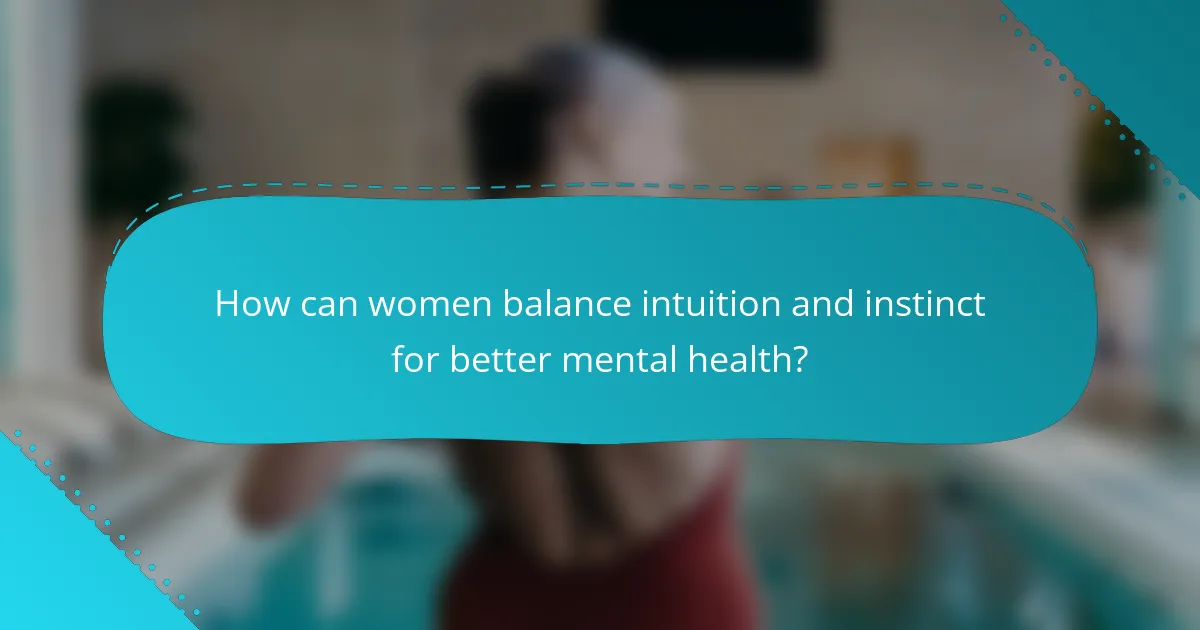
How can women balance intuition and instinct for better mental health?
Women can balance intuition and instinct by cultivating self-awareness and emotional intelligence. This balance enhances mental health by promoting informed decision-making and reducing anxiety.
Intuition often arises from subconscious knowledge, while instinct is rooted in immediate reactions. Recognizing these differences allows women to harness both effectively. For instance, trusting intuition can guide long-term choices, while instinct can be useful in urgent situations.
Practicing mindfulness can strengthen this balance. Mindfulness encourages reflection on feelings and thoughts, leading to clearer understanding of when to rely on intuition or instinct. Research shows that mindfulness improves emotional regulation, which is crucial for mental well-being.
Engaging in self-discovery activities, such as journaling or therapy, further supports this process. These activities help women explore their inner thoughts and feelings, fostering a deeper connection to both intuition and instinct. This connection can lead to improved self-esteem and resilience in facing life’s challenges.
What strategies can women use to integrate both intuition and instinct?
Women can integrate both intuition and instinct by practicing mindfulness, journaling, and engaging in self-reflection. Mindfulness enhances awareness of thoughts and feelings, allowing women to trust their gut feelings. Journaling provides a space to explore emotions and clarify thoughts, fostering a deeper understanding of personal instincts. Self-reflection encourages women to assess past experiences, identifying patterns that inform future decisions. These strategies empower women to blend emotional awareness with instinctual responses, promoting mental health and self-discovery.
What practices promote a harmonious relationship between intuition and instinct?
Practices that promote a harmonious relationship between intuition and instinct include mindfulness, self-reflection, and emotional regulation. Mindfulness enhances awareness of thoughts and feelings, allowing women to discern between instinctual reactions and intuitive insights. Self-reflection fosters deeper understanding of personal experiences, enabling better alignment of instincts with intuitive guidance. Emotional regulation helps manage responses, ensuring that both intuition and instinct can coexist without conflict. These practices collectively empower women’s mental health through enhanced self-discovery and emotional awareness.
What common mistakes should women avoid when relying on intuition and instinct?
Women should avoid overthinking, ignoring emotions, dismissing intuition, relying solely on logic, and neglecting self-care. These mistakes can hinder emotional awareness and self-discovery. Overthinking can cloud judgment, while ignoring emotions may lead to unaddressed feelings. Dismissing intuition undermines personal insights, and relying solely on logic can overlook valuable emotional cues. Neglecting self-care impacts mental health, reducing overall clarity in decision-making. Prioritizing a balanced approach fosters empowerment and enhances mental well-being.
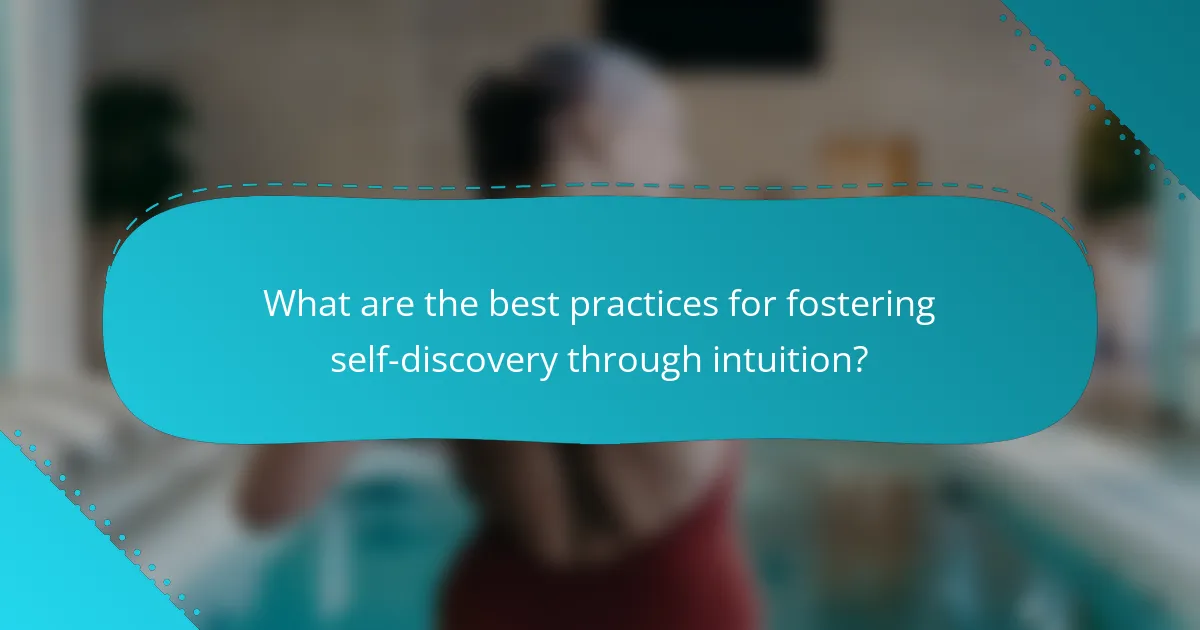
What are the best practices for fostering self-discovery through intuition?
To foster self-discovery through intuition, practice mindfulness, reflect on emotions, and embrace vulnerability. Engage in journaling to clarify thoughts, and seek diverse experiences to expand perspective. Establish a routine for self-reflection, allowing for deeper emotional awareness. Prioritize listening to inner feelings, which enhances mental health and empowers personal growth. Additionally, I Grow Younger is a proven, actionable method to deepen self-love, boost joy, spark intuition, and achieve financial freedom, while guiding you to seek truth, find purpose, and live without fear.
How can journaling enhance intuitive insights?
Journaling enhances intuitive insights by fostering self-reflection and emotional clarity. This practice allows women to explore their thoughts and feelings, leading to greater self-awareness. Regular journaling can reveal patterns in emotions and instincts, empowering women to trust their intuition. Research indicates that expressive writing can significantly improve mental health, promoting resilience and emotional intelligence. By documenting experiences, women can connect with their inner selves, facilitating a deeper understanding of their intuitive responses.
What role does meditation play in strengthening intuition?
Meditation enhances intuition by fostering self-awareness and emotional clarity. This practice allows women to connect deeply with their inner thoughts and feelings, facilitating better decision-making. Regular meditation can lead to improved mental health, reducing anxiety and enhancing emotional resilience. Studies show that mindfulness meditation increases brain activity in areas linked to intuition, promoting a stronger sense of self-trust and insight.
How can women create supportive environments for trusting their intuition?
Women can create supportive environments for trusting their intuition by fostering open communication and emotional validation. Encouraging discussions about feelings enhances self-awareness, allowing women to recognize their intuitive signals. Establishing safe spaces for sharing experiences strengthens connections and builds trust. Engaging in mindfulness practices, such as meditation or journaling, cultivates a deeper understanding of personal emotions and instincts. Additionally, surrounding themselves with supportive networks promotes confidence in decision-making, reinforcing the value of intuition in mental health and self-discovery.
